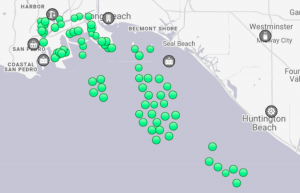In February, World Trade Center San Diego (WTC) hosted the seventh and final workshop of its MetroConnect V program. The session brought in experts from around the region to discuss the movement of goods and integration of supply chain operations across a firm. Partners for the session included JAS Forwarding, the University of San Diego Supply Chain Management Institute, the City of San Diego, and California International Trade Center.
Here are six key takeaways from a very informative session:
1. Shipping costs are at an all-time high, while schedule reliability for ocean freight is at an all-time low.
A brutal mix of COVID-19-related factors have placed tremendous stress on a system that, in a normal year, already sees congestion through the holiday season into March. Expect to see abnormally high prices into the summer months and account for the extra time it may take your goods to reach their destination.

Illustration of ocean liner congestion coming into the container ports of LA and Long Beach
2. Less passenger air travel has led to longer lead times for air freight.
Typically, 45 to 50 percent of global air cargo is carried in the belly holds of passenger aircraft. As governments around the world now shift their focus to rapid vaccine distribution, other types of air freight are competing for space on limited aircraft.
3. Export regulation around Hong Kong and China has changed.
From an export regulation standpoint, Hong Kong is no longer treated as a separate entity from China. This is a policy that is expected to remain with the new Biden Administration.
4. The Department of Commerce has imposed new BIS regulations on exports.
There are new BIS regulations for exported goods and services that “could” be used by military end users. Denied Party Screening has never been more important.
5. Supply chains continue to become more digitally and globally integrated.
With Industry 4.0, digitally connecting the various partners within a supply chain will require collaboration, trust, commitment, and risk-sharing, as well as leadership from larger channel partners.
6. Foreign Trade Zones can save you significant time and money.
Foreign Trade Zones (FTZs) can be a valuable resource for San Diego businesses that import raw materials for domestic production or reexport finished products. You can learn more about San Diego’s FTZ program here.
Next steps for MetroConnect companies
World Trade Center San Diego will pilot a Digital Trade Series with California International Trade Center (CITC) to help SMEs grow exports through online channels. The inaugural installment of this global e-commerce mini program will run through the Spring and serve the current MetroConnect V cohort. Businesses will undergo a needs assessment analyzing their existing digital trade capabilities before receiving a customized action plan for enhancements to their website and online sales processes.
Interested in growing your business internationally?
World Trade Center San Diego works directly with companies – free of charge – to help them expand internationally and grow in San Diego. Whether your small company is interested in learning about exporting and international growth, or your small or medium sized company is ready to export and grow internationally, World Trade Center San Diego is here to help.
You might also like: